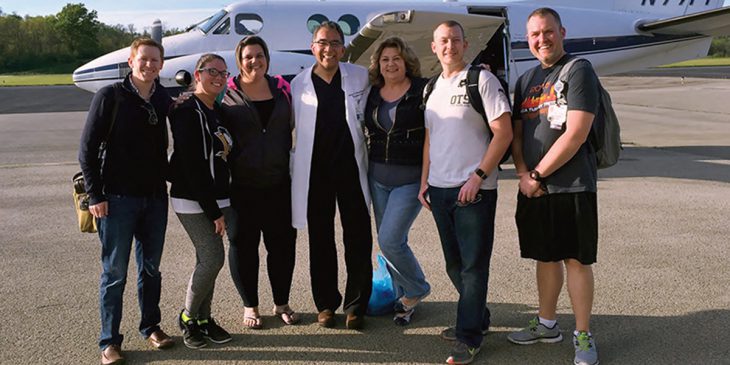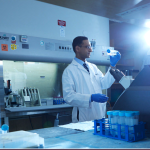It’s another busy day at UPMC Children’s Hospital of Pittsburgh.
Paula Eicker, MSN and senior director of oncology, transplant and neuro diagnostics, knows that each time her phone rings, the caller may have news that a child is about to receive a much-anticipated, life-saving liver transplant.
Eicker has cared for transplant patients for more than 30 years, and worked alongside transplant pioneer Dr. Thomas E. Starzl early in her career. With so much experience, preparing the clinical team for transplant surgery has become second-nature.
When the call comes, Eicker carefully reviews care details with the surgeon and quickly coordinates logistics, including staffing, equipment and lodging. An estimated surgery time is established, and a group text message alerts the clinical team to be on standby. Once an operating room time is confirmed, a text to the team regarding their flight time and pick-up location is sent. In a unique twist to traditional transplant surgery, the patient is not coming to UPMC Children’s — the transplant team is travelling to the patient.
One of the busiest and most respected pediatric liver transplant programs in the world, UPMC Children’s now shares its expertise through two unique partnerships on the East Coast.
“Transplant is a life-saving option for many childhood liver diseases,” Eicker said, “but organ allocation and donor availability often mean patients must travel far from home for care and often face long wait times.”
To help decrease wait times and increase organ availability for patients, UPMC Children’s has partnered with the University of Virginia Children’s Hospital and AdventHealth for Children to create the East Coast Network for Pediatric Liver Transplants.
 When patients at those centers require a liver transplant, a complete clinical team comprising surgeons, anesthesiologists, nurses and OR technicians travel to the partner hospital to perform the transplant. Following surgery, a surgeon and two transplant nurses remain on-site to help ensure quality outcomes for those patients by offering guidance to partner colleagues. Debriefing sessions with staff from each center take place after each transplant to celebrate achievements and identify opportunities for growth.
When patients at those centers require a liver transplant, a complete clinical team comprising surgeons, anesthesiologists, nurses and OR technicians travel to the partner hospital to perform the transplant. Following surgery, a surgeon and two transplant nurses remain on-site to help ensure quality outcomes for those patients by offering guidance to partner colleagues. Debriefing sessions with staff from each center take place after each transplant to celebrate achievements and identify opportunities for growth.
“The network is an excellent opportunity to expand UPMC Children’s expertise while reaching patients who otherwise wouldn’t receive life-saving transplants,” said Diane Hupp, DNP, vice president of operations and patient care services, and chief nursing officer at UPMC Children’s.
Mobilizing an entire transplant program requires an extraordinary amount of research and development, clinical knowledge sharing and logistical coordination.
“Our nurses provide education and practicum,” Hupp said. “During on-site visits and meetings and teleconferences, they assess knowledge and resources, conduct a gap analysis, develop plans, map policies and procedures, and provide real-time, on-site mentoring.”
It took two years of planning before the University of Virginia partnership was finalized in January 2016, Hupp added. Four months of concentrated, didactic nursing education and simulation of care occurred before the first liver transplant was completed in May of that year. Since then, 17 total successful transplants have been completed. The AdventHealth for Children partnership followed in 2018, and four patients have undergone successful transplants.

“Nurses have been instrumental to the success of these programs because they provide a continuum of care for the patient and ongoing education and mentorship for their partner colleagues,” Hupp said. “The success of the program is based on the commitment of the medical staff to reach patients in need of transplants who live in areas where those services didn’t exist. They are truly dedicated to fulfilling the needs of these patients.”
In 2018, the team traveled more than 14,000 miles to provide 12 children with life-saving liver transplants. They also paved the way for successful partnerships that will potentially serve generations to come.









